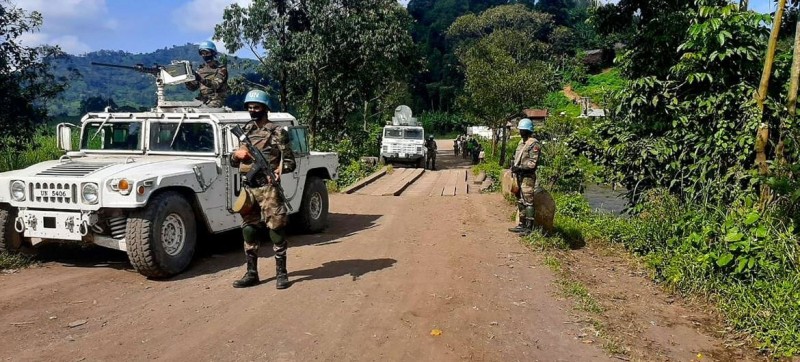UN peacekeepers on patrol in the Democratic Republic of the Congo (file). Peacekeepers in the Democratic Republic of the Congo (DRC) have stepped up their presence in the area around a camp for displaced people in Ituri province following a deadly attack this week, the United Nations said on Thursday. UN chief Antonio Guterres strongly condemned Tuesday’s assault by Coopérative pour le dévelopement du Congo (CODECO) militias – an association of Lendu groups – against the Savo site, located in the Djugu territory.
At least 58 people were killed and 36 injured.
Robust patrols continue
Peacekeepers serving with the UN mission in the country, MONUSCO, continue to conduct robust patrols in the area.
They have also reinforced their Temporary Operating Base there with troops from Bunia, the provincial capital, who will focus on providing security around the Savo site.
On Wednesday, MONUSCO mobilized two helicopters to facilitate medical evacuation of 19 wounded civilians to Bunia, while humanitarian workers provided medical supplies.
‘Reprehensible’ attacks
The Secretary-General has expressed his deepest condolences to the victims of the attack, and wished a swift recovery to the injured, UN Deputy Spokesperson Farhan Haq said in a statement.
“He calls on the Congolese authorities to investigate these incidents and bring those responsible to justice, noting the reprehensible nature of these attacks on a site where civilians who had already been displaced by conflict had sought protection and humanitarian assistance,” the statement said.
MONUSCO has maintained communication with the military governor of Ituri province to discuss security arrangements and an increased presence of national security forces.
The Mission also engaged with the Territorial Administrator and key local and provincial stakeholders, including leaders of the Hema and Lendu communities, to urge them to intervene to de-escalate tensions and prevent an increase of communal violence in Djugu territory.
Scaling up humanitarian aid
Separately, the UN refugee agency, UNHCR, and the International Organization for Migration (IOM) issued a joint statement on Thursday condemning the attack.
Their teams in Ituri are coordinating with other humanitarians to scale up the emergency response.
The Savo site is managed by UNHCR and partner CARITAS, and hosted more than 20,000 displaced people, including more than 13,000 children. Many of the residents have fled to Bule town, some three kilometres away.
Roughly 230,000 people live in more than 60 displacement sites across Ituri province that are managed by UNHCR and IOM.




Comments are closed.